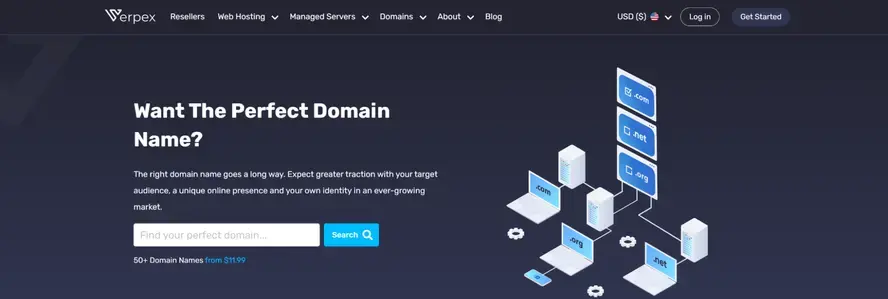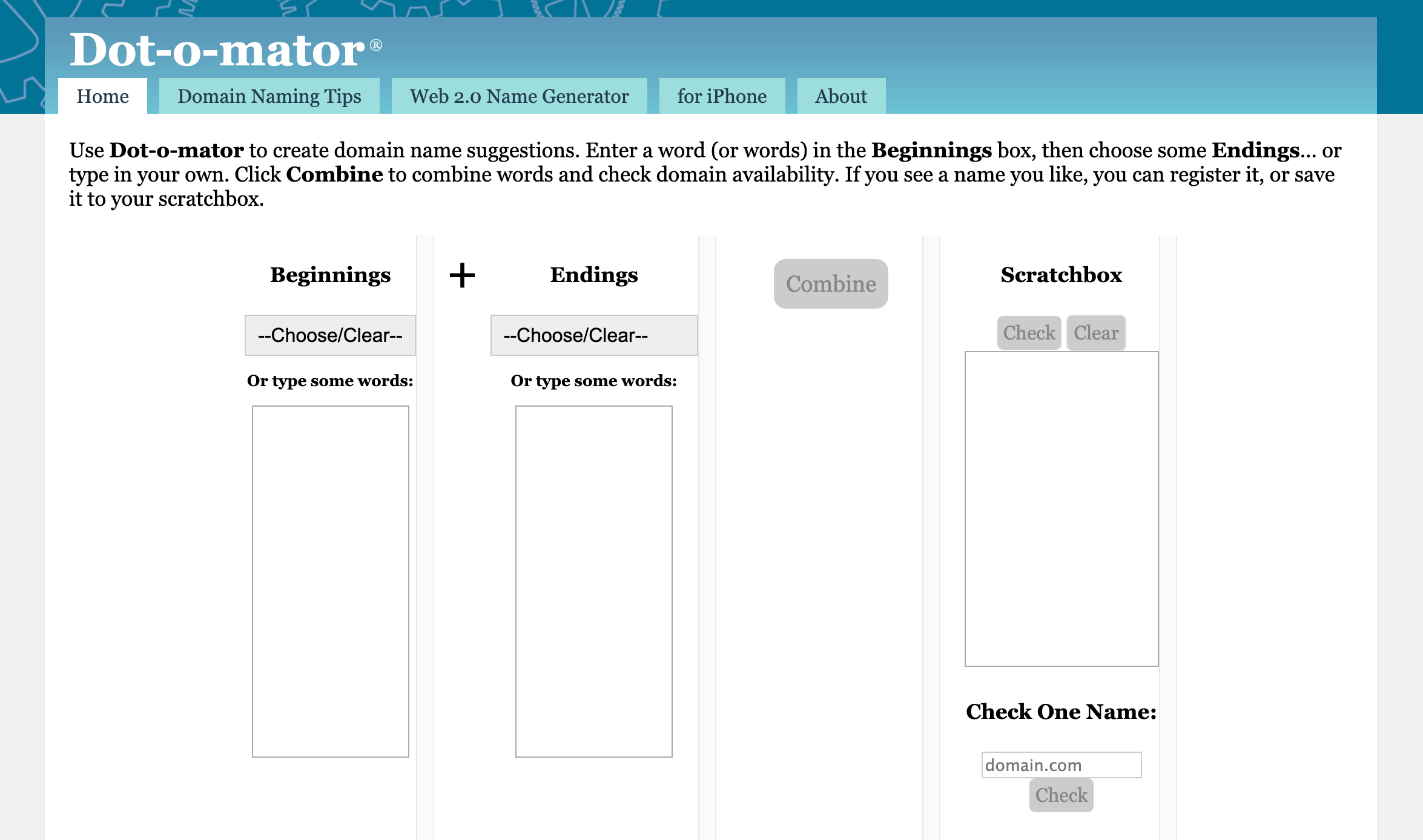If you're planning to launch a website, congratulations! Whether you're promoting a business, diving into the reseller hosting market, sharing your hobbies, or connecting with others, choosing the right domain name is the essential first step. Your domain serves as the front door to your brand, making a strong impression that can set you apart in a crowded market.
This decision is especially crucial for those venturing into the reseller hosting business, as a well-thought-out domain name is the foundation for building a successful online presence. But what makes a domain name effective, and why is this choice so important? This guide will provide the insights you need to make a strategic decision for long-term success.
What is a Domain Name?
A domain name is the address of your website. It's what people will type into their browser to find your site. For example, the domain name of this website is www.verpex.com.

Each element of a domain name (the parts separated by a dot) can be up to 63 characters long, and can contain letters, numbers, and hyphens. They cannot, however, start or end with a hyphen.
Why is Choosing the Right Domain Name Important?
Your domain name is important for several reasons. Let's Explore these now.
It Needs to Reflect Your Brand
Your domain name is one of the first things potential customers will see when searching for your product or service online. As such, it needs to accurately represent your business and the value you offer.
For example, if you're a web designer, a domain like www.janesmithdesigns.com or www.smithco.com would clearly reflect your brand and professional services. Similarly, if you’re starting a blog about cooking, a domain like www.easyveganrecipes.com or www.healthymexicanfood.com would immediately inform visitors about your content.
When selecting a domain, it’s essential to avoid overly complex or tricky names that could confuse potential visitors. A simple, memorable domain makes it easier for users to find your site and ensures that your brand is clearly understood.
The same principle applies when entering the reseller hosting business. A domain name that highlights your niche or service offerings can set you apart from the competition. Choose a name that's simple, relevant, and easy to spell—avoid overly clever or complicated names that could confuse potential clients or make it difficult to find your site.
It Can Affect Your SEO
In addition to making it easier for people to find your site, a good domain name can also help you rank higher in search engine results.
How? Domain names that include relevant keywords are more likely to rank higher in SERPs than those without keywords.
Of course, you don't want to stuff your domain name full of keywords. Not only will this make it difficult for people to read and remember, but it will also likely get your site flagged for keyword stuffing, which is a major no-no in the world of SEO.
A good rule of thumb is to stick to one relevant keyword in your domain name. Anything more than that, and you're probably overdoing it.
Of course, there is a lot more to SEO than just your domain name, but it's still a good idea to keep this in mind when choosing yours.
It Needs to Be Easy to Find
When you're choosing a domain name, you also need to make sure it's easy for people to find. That means it should be short, simple, and easy to remember.
As we mentioned before, you want to avoid domain names that are cutesy or difficult to remember or spell. A good domain name is one that people will be able to remember without having to write it down.
It's also a good idea to avoid using anything other than letters in your domain name. While numbers or hyphens might be necessary in some cases, they can make your domain name more difficult to remember and type.
If at all possible, you want your domain name to be something people can type into their browser without too much thought or effort.
It Needs to Be Available
Of course, you also need to make sure that your desired domain name is actually available. Chances are, if you're thinking of it, someone else might’ve thought of it too.

To check availability, you can do a quick search on the Verpex domain availability tool.
Just enter your desired domain name into the search bar and hit enter. If the domain you want is available, you'll be able to register it.
If your first choice isn't available, don't despair. There are a lot of great domain names out there. Just keep brainstorming until you find one that's available and that you're happy with.
How to Choose a Domain Name
Now that you know why it's important to choose the right domain name, you might be feeling a bit overwhelmed. How are you supposed to come up with something that is both memorable and SEO-friendly?
Here are a few tips to help get you started:
1. Keep it Short and Simple
The best domain names are short, sweet, and to the point. If you can keep yours under 15 characters, that's even better. Not only will this make it easier for people to remember, but it will also be less susceptible to typos.
2. Make it Memorable
If you want people to actually remember your domain name, you need to make it memorable. That means avoiding anything that is too long or difficult to spell. You might also want to consider using a play on words or something that rhymes.
And if you're creating a website for a business, the domain should likely include your branded name in some way. Even if your company doesn't have a lot of brand awareness at the moment (and technically isn't memorable yet) building your domain around your brand is an essential step toward creating familiarity with your visitors and customers.
3. Use Keywords
Including a keyword in your domain name can be a great way to give your SEO a boost. Just make sure that you don't go overboard, or you risk being penalized by search engines for keyword stuffing.
4. Avoid Hyphens
While hyphens can be helpful in making your domain name more readable, they can also make it more difficult to remember. If you do decide to use them, limit yourself to one or two at the most.
Several years ago, it was in fashion to use hyphens as a way to keyword stuff your domain name. So, for example, you might have chosen something like "best-widget-maker-for-small-business.com." While this might have worked back then, it will now hurt your SEO. Plus, it just looks sloppy, so don't do it.
5. Brainstorm with Friends and Family
If you're struggling with this whole process of coming up with a domain name, try brainstorming with friends and family. See if they have any suggestions that you might not have thought of.
6. Be Creative
Thinking creatively about your domain name can be the key to landing on something that really works. After all, this is your chance to put your own personal stamp on your website. If you can think of something unique that still meets all the other criteria on this list, go for it!
7. Use a Domain Name Generator
If you're really stuck, you can always use a domain name generator to help you come up with ideas. There are a number of different ones available, so take some time to explore a few and see which one you like the best.

Here are a few that you may find worthwhile:
Choosing a Domain Extension
In addition to choosing the perfect domain name, you also need to select an appropriate domain extension. This is the ".com" part of your address.
There are a lot of different domain extensions to choose from, but ".com" is still the most popular by far. If you can get a ".com" domain name that meets all the other criteria on this list, that's probably your best bet.
That being said, there are certain situations where another domain extension might be more appropriate. For example, if you are targeting a specific country or region, you might want to use a country-specific domain extension like ".us" or ".uk".
Additionally, there are certain industry-specific domain extensions that can sometimes be beneficial. Some examples include ".biz" for businesses, ".edu" for educational institutions, and ".gov" for government agencies.
Ultimately, the decision of which domain extension to use is up to you. Just be sure to do your research so that you choose one that is appropriate for your website and your target audience.
Conclusion
Your domain name is often the first impression customers get of your business, so selecting the right one can significantly impact your brand’s online presence. Following these seven steps will put you on the path to a domain name that’s memorable, SEO-friendly, and suited for long-term success.
If you’re launching a reseller hosting business, a niche-focused domain can help you stand out. Ready to secure your domain and make management easy? Get started with domain registration and explore Verpex Hosting’s reseller packages, as well as our shared hosting plans and managed servers, all designed to support your clients with reliable and scalable solutions.
Frequently Asked Questions
How much does a domain cost monthly?
Usually, domain names cost from $0.99 to $12 per month. However, at Verpex, we offer a free domain name with our hosting packages.
Is selling domain names for profit legal?
Yes, selling domain names for profit is perfectly legal. What’s not legal is purchasing a domain name that incorporates a trademarked name with the intention of getting profit from the reputation of the trademarked entity.
What is the difference between web hosting and domain?
Web hosting and domain are two different things, even though they are closely related. A domain is the address of your website, while web hosting is where your site files are physically stored.
How do I see who owns a domain name?
You can use the WHOIS domain lookup tool to find out who owns a certain domain name.

Brenda Barron is a freelance writer and editor living in southern California. With over a decade of experience crafting prose for businesses of all sizes, she has a solid understanding of what it takes to capture a reader's attention.
View all posts by Brenda Barron




















